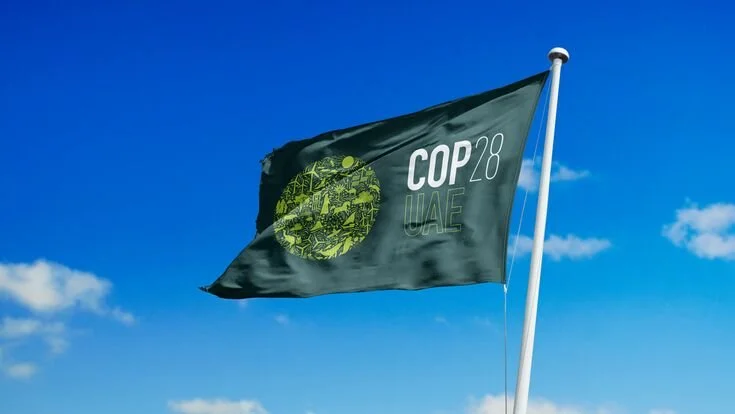Africa’s Agenda at COP28
As the 28th annual Conference of Parties (COP28) climate conference looms on the horizon, the world’s attention is shifting to the myriad contentious agenda items that will dominate discussions in Dubai.
Nowhere is the significance of COP28 more pronounced than in Africa. Despite having the lowest per capita emissions and contributing only about 2.8% to global emissions, the Intergovernmental Panel on Climate Change says Africa is facing the most severe climate-related challenges of any continent. These challenges manifest vividly through an increasing frequency of disasters such as floods, earthquakes, and droughts, with fresh examples like Cyclone Idai that struck southern Africa in 2019 – resulting in a 4.3% GDP loss and up to $1.8 billion in damages in Zimbabwe alone. Despite this, Africa receives the lowest percentage of global climate finance by far, exacerbating its vulnerability to climate-induced shocks.
This Insights explores Africa's agenda at COP28, examining the critical issues occupying the minds of African leaders and negotiators and forecasting potential outcomes from the annual climate conference.
2023: A Blockbuster Year for Climate Action in Africa
2023 has emerged as a blockbuster year for climate action in Africa.
In September, African leaders gathered in Nairobi, Kenya, for the inaugural Africa Climate Summit, which resulted in $26 billion in climate-focused commitments from governments, private enterprises, banks, and more. The Summit also resulted in the adoption of the Nairobi Declaration, a foundational document shaping the continent's stance in the global climate change discourse through COP28 and beyond. The Declaration outlines a vision for economic transformation aligned with Africa’s climate imperatives, emphasising key goals such as increasing the continent's renewable generation capacity, achieving a global carbon tax regime, and pushing for a responsive international financing architecture – one that encompasses debt restructuring, relief measures, and the development of a Global Climate Finance Charter.
Later that month, the climate discussions continued in Manhattan for New York Climate Week on the margins of the UN General Assembly. Key discussion areas included financing crucial technologies for net-zero goals, the nexus of climate and health, and global equity considerations, navigating the dual challenge of decarbonising the economy, addressing the energy deficit, and directing funds to viable projects in developing countries without yielding to the constraints of the so-called "sovereign ceiling."
Climate discussions were also front and centre at the UN General Assembly, with Secretary-General António Guterres convening a dedicated Climate Ambition Summit, aimed at accelerating the adoption of renewable energy, phasing out fossil fuels, and fostering crucial partnerships to advance shared climate objectives in anticipation of COP28.
African Unity and Top Agenda Items for African Leaders
COP28 stands as a pivotal moment for Africa to articulate both its climate needs and the innovative solutions the continent offers in addressing the global crisis. Importantly, it provides a platform to align Africa's development priorities with the broader global climate agenda, emphasising that climate challenge is inseparable from Africa’s development needs.
Heading into COP28, Zambia, as the current chair of the African Group of Negotiators, continues its central role in facilitating cohesive negotiations for all 54 countries. This unified approach helps the continent to present a unified front during climate change negotiations, amplifying its impact and influence on critical decisions. The dominant stance of the majority of African countries at COP28 is clear-cut: They support the necessity for flexibility in shifting towards a more sustainable energy mix, all the while safeguarding their economic development and industrialisation objectives and stressing that they should not unfairly be penalised for an issue it played only a minimal role in causing.
Indeed, Africa's transition to clean energy might very well hinge on the funding generated through the utilisation and sale of the continent's abundant oil and gas resources. This funding piece of the equation will be front and centre on the agenda for African leaders at COP28: addressing Africa's climate finance deficit, driving new and directing existing investments toward climate-smart infrastructure, and exploring mechanisms like green recovery bonds.
On a broader scale, pivotal issues to be navigated involve the debate on fossil fuel phaseout – whether it should be immediate or gradual, and if technological solutions can salvage their use with emissions abatement. The tension between the imperative for drastic action and concerns over energy security and economic interests of major producers will no doubt be palpable, especially given the Emirati hosting of the conference. The spotlight will also be on the “loss and damage fund,” negotiations around which remain unresolved.
COP28 Expected Outcomes
Expected outcomes at COP28 are subject to the perennial tension between ambitious aspirations and the pragmatic constraints of achieving unanimous global consensus. While activists often find themselves disillusioned and critics emphasise the inadequacy of global efforts, the significance of COP as the primary international climate forum remains undisputed.
Even the most optimistic of analysts do not forecast international consensus on a carbon pricing system or the implementation of a global carbon tax. The spectre of "green protectionism" introduces further complexities, with initiatives like the US Inflation Reduction Act and the EU's Carbon Border Tax sparking jurisdictional battles. Amid these dynamics, there are discussions about the potential for the United Arab Emirates and Saudi Arabia to propose a more stringent resolution on phasing out fossil fuel exploration and production, with recognition of the need for flexibility in targets – especially in Africa.
Over the long term, backing Africa in achieving an equitable transition could emerge as the most influential and crucial strategy for establishing the continent as a leading force in effectively addressing climate change, a potential it is poised to fulfil. Undoubtedly, an Africa that receives support and encouragement from the developed world, charting its distinct developmental path, is likely to be more receptive to the necessary clean energy transition to comprehensively tackle climate change once and for all.

